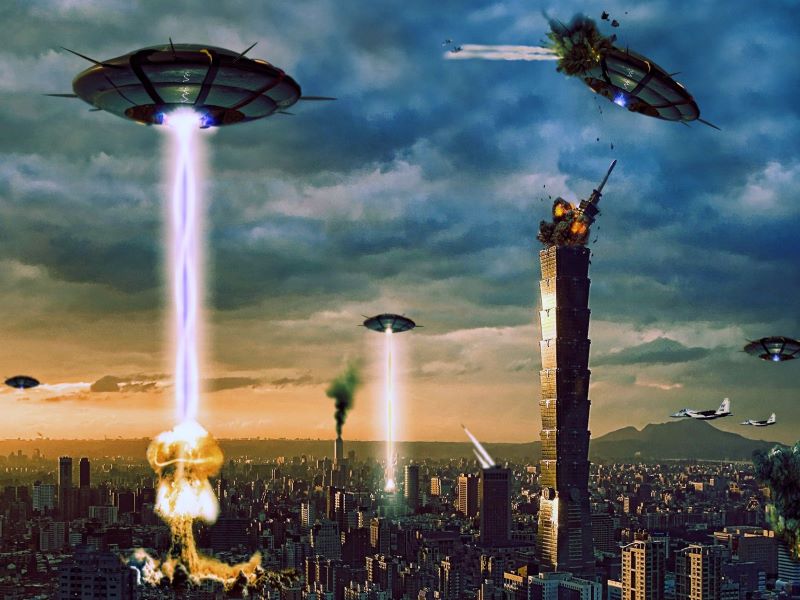Imagine if there was an alien invasion on Earth. Some creatures from a planet light-years away were looking to destroy our home. Destroy everything and everyone we hold dear to our hearts. How would we react?
Would we focus on our differences, with each country fighting the threat individually? I don’t think so. We would unite and coordinate a defence of Earth as one species. Dismissing differences of race, religion or politics. These differences would become trivial in the face of an alien invasion seeking to destroy humanity.
An alien invasion would provide us with a common enemy. It would create solidarity amongst people, and make us see one another for what we are. One species, united by the need to protect our home. In the face of an alien invasion, we would be prepared to sacrifice our lives to protect our home and one another, for the good of humanity as a whole.
An alien analysis of humanity
If the alien invaders were to reconnaissance before their invasion they may be surprised by our reaction. What would they see prior to the invasion? On analysing us they would see a highly intelligent, sophisticated species. But one embittered by petty squabbling. Snippets of a report may look something like this (alien report in italics).
Disunity abounds, and the species draw imaginary lines in the land, dividing one another into zones. The interests of the humans living in one particular zone are prioritised over the humans living in other zones, they call these zones countries.
They would see selfishness and a lack of cooperation to satisfy the needs of the entire race of humanity. The aliens would also come to realise that humans are facing an existential crisis — a climate crisis. The crisis is being caused by humans. The way they behave towards their planet is putting the conditions that give humans life under threat. The changes they are making are going to destroy their own species.
The aliens would also come to realise humans are very much aware of the threat. But for some reason, they continue to behave in the same way. This behaviour is making the situation far worse.
The humans have little respect for the environment that sustains their lives, nor other species of life on the planet. On analysing humanity, it would be easy for the alien invaders to conclude that what lay in front of them was an easy target. One ripe for invasion.
The climate crisis is our alien invasion
What the alien invaders wouldn’t see is that humans are quite brilliant in reactive situations. Faced with a crisis, we’re able to organise effectively to implement a plan of action. In this case, our sole focus would be on destroying the threat. Nothing else would be of consequence when facing this crisis. Why would it? We would be facing our doom. Anything that wasn’t focused on destroying the threat would be meaningless.
If we take the unlikely event of an alien invasion out of the equation, the climate crisis has many similarities. The climate crisis is our common enemy, it is destroying us. And yet, we go about each day as if nothing is happening. Imagine we reacted to the climate crisis in a way I would like to think we would react to an alien invasion. All of our energy would be directed towards the crisis. Nothing else would matter.
Yet here we are. We’re faced with a crisis that is literally going to create conditions that will make the Earth inhospitable. This could result in our destruction. Yet we go about our day as if nothing is happening. Who cares about something like Brexit, when the whole of humanity faces extinction. Would we be talking about the consequences of Brexit if there was an alien invasion? No, we would be focused on the alien invasion. Anything else would fall by the wayside.
If we can’t see it, it’s as if it’s not happening
The problem with the climate crisis is that the effects are happening slowly. Day to day we’re not able to see the impacts, and we can live as we always have. What is it going to take for us to treat the crisis with the respect it deserves?
When talking about this very issue, Jean-Francois Bastin, the lead author on a paper outlining the possible impacts of climate change on cities said;
“History has repeatedly shown that data and facts alone do not inspire humans to change their beliefs or act…the intangible nature of reporting on climate change fails to adequately convey the urgency. It is hard to envisage how 2C of warming, or changes in average temperature by 2100, might impact on daily life.”
Quite frankly, the climate crisis just doesn’t feel like a crisis. It doesn’t evoke the same emotions that an alien invasion would. The problem is that when the crisis does feel like a crisis, it will be far too late for us to do anything about it. Our fate will be sealed.
Never say never, but it would probably come as a surprise to most if aliens invaded Earth. But what we need is for humanity to treat the climate crisis as if there were an alien invasion. The only way for us to solve the crisis is to forget about our differences. These are inconsequential in light of the threat. We must unite as a species.
If countries focus on their self-interests, rather than trying to solve the problem in a unified, coordinated way, we have no hope of success. If we unite under one movement and work with solidarity towards an aim far more important than the self-interests of individuals, companies, or countries, we can solve the crisis.
The climate crisis may well be an enemy of our own making, but we must start to treat it with the respect it deserves. Let’s unify under one flag. If we fight the threat together and mobilise the whole of humanity to solve the crisis, we would be a force to be reckoned with.



